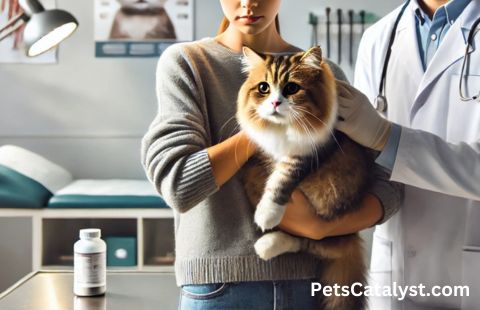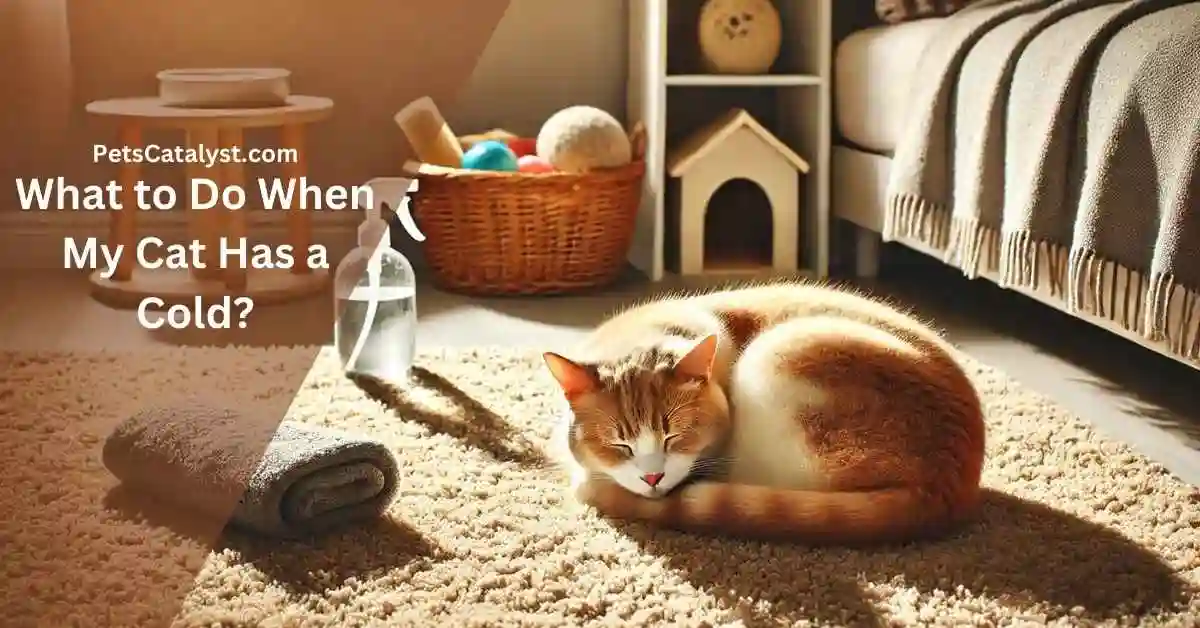What to do when my cat has a cold? Well, cats can catch colds too, which might be really surprising to you. Sneezing, watery eyes and lethargy are all typical but you need to know how to comfort your cat and when to call a vet.
This guide will provide guidance on comforting your feline companion, recognizing alarming signs, and employing helpful remedies when they feel cold. With years of experience caring for two dogs, a turtle, and a cat, I have picked up on a thing about maintaining the wellbeing of my scaly and furry family.
So, let us investigate approaches to nurse your kitty back to optimal condition and know when it is essential to seek assistance from a veterinary professional. Knowledge is power, especially when it comes to understanding our pets. So read on to gain insight into helping your friend feel like their cheerful self once more.
What Are Cat Colds?
Upper respiratory infections (URIs), or colds as we know them, caused by viruses and bacteria, can be transmitted from one cat to another. These infections are similar to a human cold, are caused by pathogens such as:
- Feline Herpesvirus (FHV): One of the primary causes of cat colds and very contagious.
- Feline Calicivirus (FCV): A typically very common virus that causes upper respiratory illness and may lead to oral ulcers.
You May Like to Read:
Recognizing the Symptoms
So, What to do when my cat has a cold? To know how to guide the treatment we first have to know what are the symptoms.
- Sneezing and Nasal Discharges: Sneezing and nasal discharge usually considered as a clear sign.
- Watery or Goopy Eyes: Eye discharge can range from clear to yellowish.
- Coughing or gagging: Your cat may have a wet or a dry cough.
- Laziness: A chilly cat can give up its beloved zoomies and choose to consist of naps.
- Lost Appetite: Sick felines typically do not really feel like eating, and if it is too blocked up to scent its meal.
Caution: If you see labored breathing or progressive symptoms, that’s a serious thing!
How to Comfort Your Sick Cat at Home
A cat with a cold is like a poorly behaved toddler at the age of 3. The following are some great and effective ways to provide relief:
Cats feel better in warmth. Take a warm blanket (on a lower stage) or a comfortable bed placed in a draft free area. And your cat will think you built them a five-star spa, because cats love warmth.
Turn on the hot shower and let your cat sit in the bathroom (not in the shower) for 10-15 minutes. It helps to clear up the stuffy nose with the steam. Tip: if your cat hates the bathroom, don’t trap them in there, that will just cause stress.
Video Credit: Veterinary Secrets
Keeping Your Cat Hydrated and Fed
Provide access to clean water consistently to avoid dehydration. If your cat refuses to drink water, you can try flavoring the water with a little low-sodium chicken broth. Your cat can put on a display like you are poisoning them, but really — all this is for their benefit.

To have more aroma and make it more enticing, warm your cat’s wet food. And if your cat still refuses to eat, try a special treat like baby food (without garlic or onion) or some tuna juice.
You May Like to Read:
When to Visit the Vet
Although many cat colds can be treated with rest and home care, some instances require a quick call to the vet:

- Difficulty Breathing: Wheezing, labored breathing, open mouth breathing should always be treated as an emergency.
- Lack of Interest in Food for Over 1 Day: Cats can rapidly develop a serious liver disorder known as hepatic lipidosis when they don’t eat.
- Fever or dehydration: a temperature greater than 102.5°F or signs of serious dehydration requires urgent attention.
Seek Vet Advice: If your cats condition does not improve after a few days, or if it worsens, always seek veterinary advice.
Preventing Future Colds
A gram of prevention is a load of cat treats. So, here is how to make your cat have a healthy life:
- Vaccines: Routine vaccinations for FHV and FCV may protect against respiratory disease.
- Lower Stress: Stress-free surroundings can help increase your cat’s immune system. Quiet spaces and playtime are also important.
- Good hygiene: Clean your cat bed and litter box frequently and any area where you may have a pet.
Humor Note: Just keep it in your mind that a cat with less stress means a happy cat.
Quick Guide: What to Do When My Cat Has a Cold?
| Symptom | Home Remedy | When to See a Vet |
|---|---|---|
| Sneezing and Runny Nose | Steam therapy, warm room, humidifier | If nasal discharge becomes yellow/green or lasts over 7 days |
| Watery or Goopy Eyes | Wipe with a warm, damp cloth | If eye discharge becomes thick or affects vision |
| Coughing or Gagging | Keep airways moist using a humidifier | If coughing persists or worsens significantly |
| Decreased Appetite | Warm up food, offer bone broth | If refusal to eat lasts more than 24 hours |
| Lethargy | Provide a warm, quiet space to rest | If the cat becomes unresponsive or extremely lethargic |
FAQs
Can I give my cat human cold medicine?
No, never give your cat human medication. These can be toxic. There are safe options, but consult your vet first.
What is the common duration of a cat cold?
The majority of colds in cats clear within 7–10 days. If signs persist, an immediate trip to the vet should be undertaken.
How can I prevent my cat from getting sick?
Prevent future infections by keeping your kitty vaccinated, stress-free and in a sanitary environment.
Do I need to isolate my sick cat from other animals?
Yes, especially if you have other cats. Cat colds spread from feline to feline like wildfire.
References:
- PetMD – Upper Respiratory Infections
- ASPCA – Cat Care Tips
- VCA Animal Hospitals – Respiratory Infection
It can be hard to take care of a sick cat, but when I know what to do when my cat has a cold, it smoothens the whole process. From setting up a nice warm and cozy space for your babe, using steam therapy and keeping an eye out for any serious symptoms, your kitty will love you for the extra TLC.
By the way, a little prevention never hurt anybody — vaccines, the stress reduction and the hygiene. If symptoms continue or become worse, call your vet.” Because, you know, our cats surely deserve nothing but the best!










